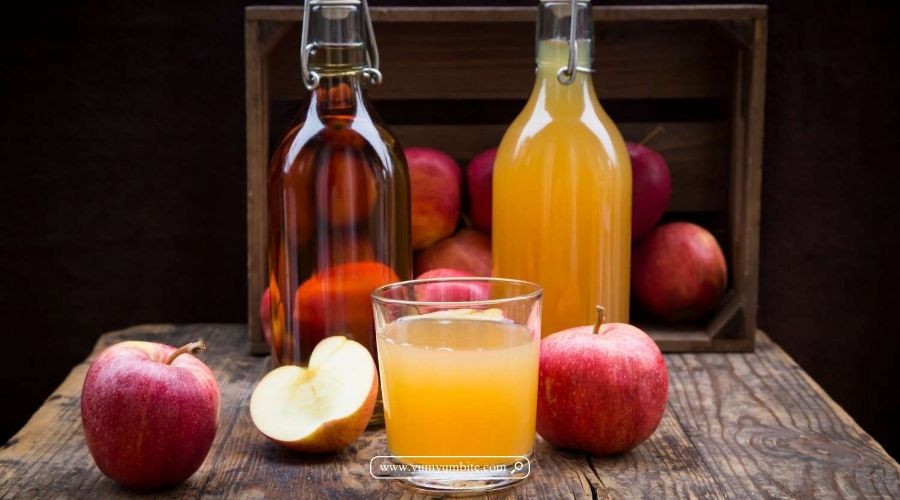Apple cider juice is a beloved ingredient in many recipes, prized for its sweet, tangy flavor and versatility. Whether you’re using it in baking, cooking, or as a refreshing beverage, its unique profile can sometimes be hard to replicate.
However, there are plenty of substitutes that can mimic its taste and function in your recipes.
In this article, we’ll explore 12+ effective apple cider juice substitutes, offering options that cater to different flavor profiles and culinary needs.
From fruit juices to vinegar-based solutions, these alternatives will help you achieve the desired results even when apple cider juice isn’t available.
12+ Apple Cider Juice Replacements for Baking, Cooking, and More
Having a range of substitutes for apple cider juice ensures that you’re never left without options when a recipe calls for it.
Each of the 12+ alternatives presented in this article offers distinct benefits, whether you need a similar sweetness, acidity, or fruity flavor.
By understanding the nuances of these substitutes, you can confidently adapt your recipes and maintain the intended taste and texture.
Whether you’re baking a cake, making a marinade, or preparing a beverage, these alternatives will help you create delicious dishes and drinks without missing a beat.
Apple Juice
Apple juice is a straightforward substitute for apple cider juice, providing a similar apple flavor, though it lacks the depth and slight tanginess of cider.
It’s ideal for recipes where the primary purpose of apple cider juice is to add apple flavor and sweetness, such as in baked goods like muffins, cakes, or in marinades and dressings.
Apple juice can also be used in beverages and cocktails.
When using apple juice as a substitute, you might need to adjust the sweetness of your recipe, as apple juice is typically sweeter than apple cider juice.
Additionally, since apple juice is pasteurized and lacks the complexity of unpasteurized cider, it may not fully replicate the depth of flavor in recipes that rely on the nuances of apple cider.
White Wine Vinegar
White wine vinegar can be an effective substitute for apple cider juice in savory dishes where acidity is needed.
It provides a tangy flavor and a hint of fruitiness, similar to the acidity found in apple cider juice.
White wine vinegar works well in salad dressings, marinades, and sauces where the acidic component of apple cider juice is required.
However, because white wine vinegar is much more acidic, it’s important to use it sparingly and adjust the quantity according to taste.
You might also need to add a touch of honey or sugar to balance out the acidity and mimic the sweetness of apple cider juice.
Pineapple Juice

Pineapple juice can serve as a substitute for apple cider juice in recipes that benefit from a fruity, tropical twist.
It has a sweet and slightly tangy flavor that can complement dishes such as glazes, marinades, or even certain baked goods.
Pineapple juice works particularly well in recipes where a vibrant flavor is desired, and the acidity can enhance the overall taste.
However, it’s important to consider that pineapple juice will impart its own distinct flavor, which may alter the taste of the final dish.
Adjust the quantity to match the sweetness and acidity needed, and be mindful of how the pineapple flavor might affect the overall profile of your recipe.
Cranberry Juice
Cranberry juice can be used as a substitute for apple cider juice, especially when a tart and slightly sweet flavor is desired. It’s suitable for use in both sweet and savory dishes, including baked goods, marinades, and sauces.
Cranberry juice offers a unique, tangy taste that can add complexity to recipes where apple cider juice is typically used.
However, cranberry juice is generally more tart than apple cider juice, so you may need to adjust the sweetness of your recipe accordingly.
It’s also worth noting that the color of cranberry juice can affect the appearance of lighter-colored dishes, so consider this when making your substitution.
Grape Juice
Grape juice can be a suitable substitute for apple cider juice, particularly in recipes where a sweet and fruity flavor is desired. Its rich, sweet taste and deep color make it a good alternative in baked goods, sauces, and marinades where apple cider juice is used primarily for its sweetness and flavor profile.
Grape juice lacks the acidity of apple cider, so if the recipe requires a bit of tang, you may need to add a splash of lemon juice or vinegar to balance the flavor.
Be aware that grape juice will impart a different flavor and color to your dishes, which might slightly alter the final result.
Lemon Juice
Lemon juice can replace apple cider juice when a tart, acidic component is needed, especially in recipes where the primary role of the cider is to provide acidity. It is ideal for savory dishes, salad dressings, and sauces.
Lemon juice has a sharp, tangy flavor that can cut through rich ingredients and brighten up a dish.
However, because lemon juice lacks the sweetness of apple cider juice, you may need to add a bit of sugar or honey to achieve the desired balance of flavors.
Use lemon juice sparingly, as its strong acidity can easily overpower other flavors in your recipe.
Orange Juice

Orange juice serves as a flavorful substitute for apple cider juice, adding a sweet and citrusy note to recipes. It works well in baked goods, glazes, and marinades where a fruity element is required.
The sweetness of orange juice is higher than that of apple cider, so you may need to adjust other sweeteners in your recipe accordingly.
Additionally, while orange juice provides a pleasant citrus flavor, it will not replicate the exact taste of apple cider, which has a more complex profile.
Be mindful of how the orange flavor might influence the overall taste of your dish.
Pear Juice
Pear juice is another alternative to apple cider juice, offering a mild, sweet flavor with a subtle fruity undertone. It is suitable for use in baked goods, sauces, and dressings where a gentle apple flavor is desired.
Pear juice is less acidic than apple cider juice, so if the recipe relies on the acidity of apple cider, consider adding a bit of lemon juice or vinegar to achieve the right balance.
Pear juice’s delicate flavor complements a variety of dishes but won’t fully replicate the complexity of apple cider.
Adjust the quantity based on the sweetness needed in your recipe and be aware of how it affects the overall flavor profile.
Peach Juice
Peach juice can be a delightful substitute for apple cider juice, especially in recipes where a fruity and slightly tangy flavor is beneficial.
Its natural sweetness and subtle acidity make it suitable for use in baked goods, marinades, and dressings.
Peach juice works well in recipes where you want to add a fresh, fruity note.
However, keep in mind that peach juice has a distinct flavor that will alter the overall taste of the dish. Adjust the quantity based on the level of sweetness and acidity needed, and consider adding a small amount of lemon juice if extra tanginess is desired.
Cherry Juice
Cherry juice can replace apple cider juice in recipes that call for a fruity and slightly tart flavor. It adds a rich, deep color and a sweet-tart taste to dishes, making it a great option for glazes, sauces, and even some baked goods.
Cherry juice is naturally sweeter and more intense than apple cider juice, so you may need to adjust the amount of other sweeteners in your recipe.
Its robust flavor can significantly alter the taste of your dish, so use it in moderation and be mindful of how it will complement other ingredients.
Hibiscus Tea
Hibiscus tea, with its tangy and floral notes, can serve as an interesting substitute for apple cider juice, especially in beverages and sauces.
The tea’s vibrant color and slightly tart flavor make it a unique alternative in recipes where a touch of acidity and a hint of floral essence are desirable.
To use hibiscus tea as a substitute, brew a strong tea and allow it to cool before incorporating it into your recipe.
Because hibiscus tea lacks the sweetness of apple cider juice, you might need to add a bit of honey or sugar to balance the flavors.
It’s best used in recipes where the tea’s distinctive taste will enhance rather than overpower the dish.
Buttermilk
Buttermilk can be a useful substitute for apple cider juice in recipes that benefit from acidity and a creamy texture.
Its tangy flavor and acidity make it suitable for baking, where it helps to activate baking soda or powder, and in dressings or marinades where a bit of tang is needed.
Buttermilk is thicker and more acidic than apple cider juice, so you may need to adjust the liquid content in your recipe and add a touch of sweetener to mimic the flavor profile of apple cider juice.
Keep in mind that buttermilk will introduce a dairy element to your dish, which might not be suitable for all recipes or dietary preferences.
How to Make Apple Cider Juice Substitute at Home
Creating an apple cider juice substitute at home can be both simple and cost-effective. This homemade substitute is designed to mimic the flavor and acidity of apple cider juice using readily available ingredients.
It’s perfect for those times when you want to replicate the apple cider flavor in your recipes but find yourself without a bottle on hand.
This substitute can be used in a variety of dishes, including baked goods, marinades, and dressings, to achieve a similar taste profile and acidity.
Ingredients:
- 1 cup apple juice
- 1 tablespoon lemon juice or white wine vinegar
- 1/2 teaspoon ground cinnamon (optional)
- 1/4 teaspoon ground cloves (optional)
- 1/4 teaspoon ground allspice (optional)
Instructions:
- Combine Ingredients: In a mixing bowl, combine 1 cup of apple juice with 1 tablespoon of lemon juice or white wine vinegar. The acidity from the lemon juice or vinegar will help replicate the tanginess of apple cider.
- Add Spices (Optional): If you want to enhance the depth of flavor and mimic the spiced notes of apple cider, add 1/2 teaspoon of ground cinnamon, 1/4 teaspoon of ground cloves, and 1/4 teaspoon of ground allspice. Stir the mixture well to ensure the spices are fully incorporated.
- Mix Thoroughly: Whisk the mixture until all the ingredients are well combined and the spices are evenly distributed. If using spices, allow the mixture to sit for a few minutes to let the flavors meld together.
- Taste and Adjust: Taste your mixture and adjust the acidity or sweetness as needed. You can add a bit more lemon juice or vinegar if you need more tang or a touch of honey or sugar if you prefer a sweeter flavor.
- Use or Store: Your homemade apple cider juice substitute is now ready to use. If not using immediately, store it in an airtight container in the refrigerator for up to one week.
Making your own apple cider juice substitute at home is a straightforward and effective way to recreate the essence of apple cider without needing to purchase it.
This substitute offers a similar balance of sweetness and acidity, making it a versatile option for a variety of recipes.
By adjusting the spices and acidity levels, you can tailor the substitute to closely match the flavor profile of apple cider.
Whether you’re baking a cake, preparing a marinade, or making a salad dressing, this homemade alternative ensures that you can achieve a comparable taste and texture.
With this simple recipe, you can confidently continue to enjoy your favorite dishes and recipes, even when apple cider juice is not available.
1. What is a good substitute for apple cider juice in baking recipes?
A good substitute for apple cider juice in baking recipes is apple juice. Apple juice provides a similar sweetness and apple flavor, though it lacks the tanginess of cider.
To better mimic the complexity of apple cider, you can add a small amount of lemon juice or vinegar to the apple juice. This combination works well in cakes, muffins, and other baked goods.
2. Can I use white wine vinegar as a substitute for apple cider juice?
Yes, white wine vinegar can be used as a substitute for apple cider juice, especially in savory dishes like marinades and dressings.
It provides acidity similar to that of apple cider juice but lacks the sweetness. To balance the flavor, you may need to add a touch of honey or sugar.
Be cautious with the quantity, as white wine vinegar is more acidic than apple cider juice.
3. How can I replace apple cider juice in a beverage recipe?
For beverages, such as cocktails or non-alcoholic drinks, you can use apple juice or pear juice as a substitute for apple cider juice.
Both options offer a similar fruity flavor, though pear juice is milder and slightly less acidic. If you want to add a bit of tanginess, consider mixing the juice with a splash of lemon or lime juice.
4. Is there a non-fruit alternative to apple cider juice for cooking?
Yes, there are non-fruit alternatives for cooking. White wine vinegar or even a mix of water and a small amount of lemon juice can work well, especially in recipes that require acidity.
For a more savory approach, you can use vegetable broth with a bit of vinegar to add complexity to your dish.
5. Can I use pineapple juice as a substitute for apple cider juice in recipes?
Pineapple juice can be used as a substitute for apple cider juice, particularly in recipes where a fruity and tangy flavor is desired. It adds a tropical twist to your dishes.
However, pineapple juice is sweeter and has a more distinct flavor than apple cider juice, so you might need to adjust the sweetness and acidity in your recipe to maintain the balance of flavors.
References
- https://www.alsothecrumbsplease.com/apple-cider-substitutes/
- https://thenymelrosefamily.com/substitute-for-apple-cider/
- https://wondermomwannabe.com/substitute-for-apple-cider/
- https://food52.com/hotline/14821-what-can-i-substitute-for-apple-cider-in-a-recipe
- https://www.reddit.com/r/Cooking/comments/vf97pi/apple_cider_substitute/


